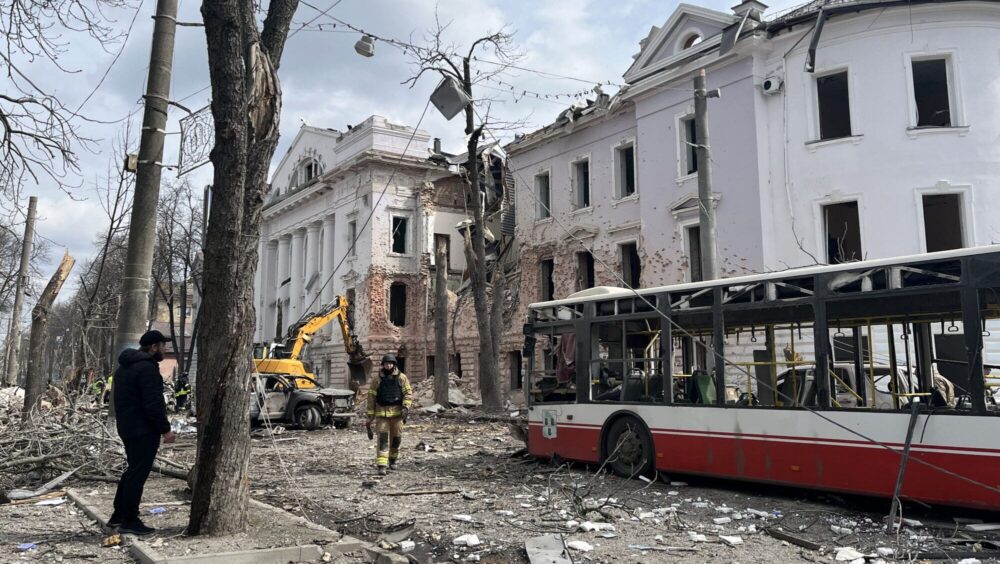
The site of the missile attack in Sumy, northeastern Ukraine, on April 13, 2025
Oleg VORONENKO / AFP
After Russia’s deadly Palm Sunday attack on the Ukrainian city of Sumy, European Union foreign ministers are meeting once again to talk tough—but act cautiously. Monday’s meeting in Luxembourg will be dominated by attempts to come up with a proper response to Russia’s bloody airstrikes, which claimed three dozen civilian lives.
According to official figures, two ballistic missiles equipped with cluster munitions—a type of weaponry banned in over a hundred countries but used by both Russia and Ukraine throughout the war—killed 34 people and injured at least 117 others (including 15 children). It was the deadliest strike in the war since September last year.
The attack drew heavy international criticism, not only because of the apparent targeting of civilians, but also because of the timing: the missiles exploded above street level in the city center as Ukrainians were heading to Palm Sunday celebrations to mark the start of the last week before Easter.
Is Trump losing his patience?
The “horrifying” attack was heavily condemned by senior U.S. officials, including State Secretary Marco Rubio and President Trump’s Ukraine special envoy, Keith Kellogg, who said targeting civilians this way “crosses any line of decency.”
Today's Palm Sunday attack by Russian forces on civilian targets in Sumy crosses any line of decency. There are scores of civilian dead and wounded. As a former military leader, I understand targeting and this is wrong. It is why President Trump is working hard to end this war.
— Keith Kellogg (@generalkellogg) April 13, 2025
President Trump is under growing pressure to show some results in his months-long diplomatic efforts for peace, in which Russia has shown an unwillingness to cooperate. The strikes on Sumy came at an especially awkward time for the U.S., as special envoy Steve Witkoff was still in St. Petersburg for his talks with the Russians.
According to several diplomats, Trump may be ready to ramp up pressure on Moscow starting on Easter, April 20th—namely by imposing heavy sanctions on energy exports—to push Putin toward agreeing to a preliminary ceasefire.
Europe to escalate?
EU foreign ministers will discuss similar options in Luxembourg today, after their Ukrainian counterpart opens the meeting and gives them a status report on the war. Kyiv expects a strong response from Brussels, including scaling up the sanctions and pledging more military aid to the country.
“The attack demonstrates once more that Putin will not be persuaded by discussions about potential concessions or other signs of weakness. He will only back down if he senses real strength,” Ukrainian ambassador to EU, Vsevolod Chentsov, said on Monday morning.
The measures reportedly on the table for Monday’s Council meeting include proposing another, 17th sanction package on Russia—focusing on the country’s “shadow fleet” of tankers that bypassed earlier restrictions—as well as using more of Russia’s €200 billion worth of frozen assets held in European banks to help Ukraine.
However, no decision is expected today, especially regarding the latter. Many EU countries still harbor doubts about the legality of seizing Russian assets—previously, Europe only seized the profits generated by them, not the funds themselves. European Central Bank President Christine Lagarde even warned that such an unprecedented move could fundamentally undermine the global trust in the euro as a reserve currency.
Still, with incoming German Chancellor Friedrich Merz signaling a willingness to at least consider the option, the idea of seizing the assets has been picking up speed recently.
And this is not the only sign that Merz might be ready to step over previous red lines regarding Ukraine. On Sunday evening, the incoming chancellor said he would donate Taurus cruise missiles to Ukraine—something that his predecessor, Olaf Scholz, has been reluctant to do for fear of escalation—as part of another coordinated Western effort to equip Ukraine with long-distance precision weaponry.
What’s more, Scholz even explicitly stated that the German Tauruses could be used to “destroy” the Kerch Bridge which connects the Russian mainland with occupied Crimea—the ultimate red line of Moscow when it comes to using Western-supplied weaponry.
